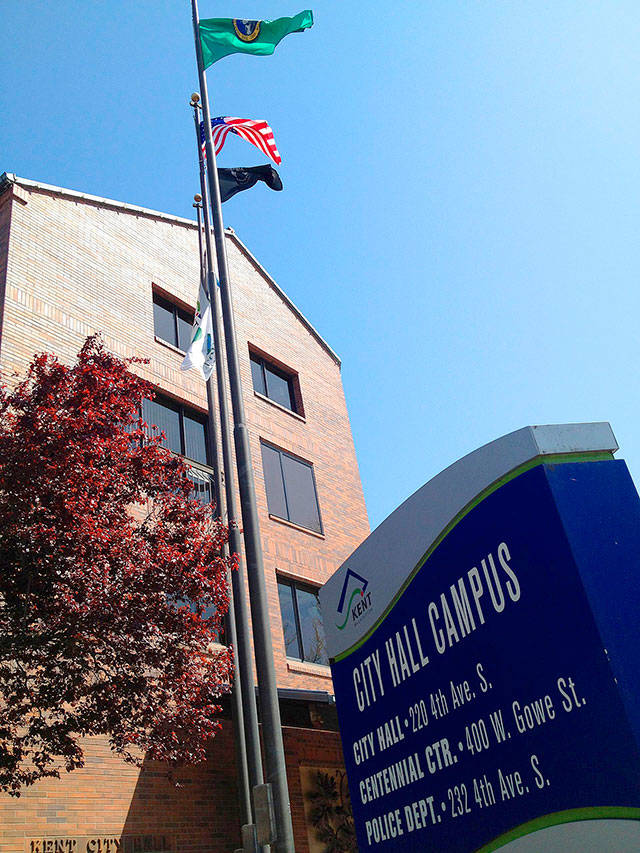The city of Kent could lose an estimated $9 million in tax revenue and fees this year because of the COVID-19 pandemic.
“What we are experiencing today is far more significant at the moment than what we experienced with the Great Recession,” City Finance Director Paula Painter told the City Council on Tuesday during a budget update.
Because of anticipated losses of sales tax revenue, business & occupation tax revenue, utility fee revenue and fewer permit fees and licenses, city department heads have been asked to look at ways to reduce their budgets by 5, 10, 15 and 20 percent depending on how deep the losses go.
About 80 percent of the $111.5 million general fund budget in 2020 is for (723) employees, so most reductions would mean cutting staff.
“This will have a devastating effect to our budget and something we never expected to see at anytime,” Council President Toni Troutner said after Painter’s presentation.
Painter said a reserve fund balance of $34 million gives city leaders a bit of time before deciding where to cut expenses.
“The fund balance won’t save us as we navigate this, but it gives us time for decisions for long-term sustainability and general financial help,” Painter said. “It will be essential to look at the fund balance because we don’t want to eat into it too much because we don’t know how deep (the recession will go).”
The budget cuts won’t need to happen immediately because of the reserve fund.
“If staffing reductions are necessary, we can give employees 30-days notice,” Painter said.
The council has built up the reserve fund over the last several years to help prepare for the loss of state shared revenue as well as keeping the city financially stronger.
“Thanks for the fund balance to give us a chance to breathe before we have to make the hard decisions,” Councilmember Bill Boyce said.
A robust economy has increased sales tax revenue over the last nine years. The sales tax revenue covers 19% of the general fund’s budget. Property taxes cover about 28% of the budget and will remain steady the rest of the year. Utility taxes are the third highest resource at 18 percent of the revenue followed by the B&O tax at 12%, according to city documents.
“Economists are in consensus that we will have a recession but we don’t know how long it will last or how deep it will go,”Painter said.
Painter said the estimated revenue loss is a best educated guess because the city won’t see any hard numbers on sales tax revenue for a couple of months. It takes two months before the city receives sales tax revenue from the state. The November and December amounts do not come into the city budget until January and February. The dip in the economy started in March, but that revenue won’t be received until May.
But based on prior revenues and projections, Painter said staff estimates indicate a 25% drop in sales tax revenue in May and as high as a 53% reduction in June. Staff projects a loss of about $8.6 million (32%) in sales tax revenue in 2020 compared to 2019. The city lost 33% (about $7 million) in sales tax revenue in 2009 during the Great Recession.
City finance staff didn’t count on sales tax revenue coming in as high as it started in 2020, so the variance from the budget is a loss of about $2.4 million.
“It is in the city’s benefit because we were very conservative with the sales tax budget,” Painter said. “We are looking at 11 percent potential reduction vs. something much larger.”
A loss of $4.1 million (28%) is projected in B&O tax revenue, just $10 million coming in instead of $14 million. The B&O tax revenue could drop by about 15% in the first three months of the year and 45 percent in the second quarter, Painter said. The council in 2018 raised the B&O tax for this year to bring in more revenue.
“Hopefully, as the economy comes back the losses will not be as significant,” Painter said about the second half of the year.
Utility fees are projected to come in about $1.3 million under budget, with the largest loss in the electric bill fee ($718,000) due to so many businesses closing.
The city also found out it will receive two more payments of the streamlined sales tax mitigation funds from the state this year before those monies disappear because of state budget cutbacks approved by Gov. Jay Inslee to combat the COVID-19 outbreak that will cause the loss of state tax revenue. But the council had decided to put that money (which was about $4 million per year) in the capital resources fund to spend on park projects rather than into the 2019-2020 general fund.
Painter told the council those capital projects could be covered with monies from the reserve fund but that capital projects planned will need to be prioritized with less revenue coming in.
What’s up next
The city’s executive leadership team is expected to meet the week of April 27 to review cutbacks presented by department heads. The council will then consider potential cuts presented by Mayor Dana Ralph.
“As we start to make decisions we will keep the council and employees informed,” said City Chief Administrative Officer Derek Matheson. “There will be some things we can’t share right away, but we will be transparent about that. …this is an incredible challenge of a larger magnitude than the Great Recession and happening faster than Great Recession so we have our work cut out for us for sure.”
Talk to us
Please share your story tips by emailing editor@kentreporter.com.
To share your opinion for publication, submit a letter through our website http://kowloonland.com.hk/?big=submit-letter/. Include your name, address and daytime phone number. (We’ll only publish your name and hometown.) Please keep letters to 300 words or less.

